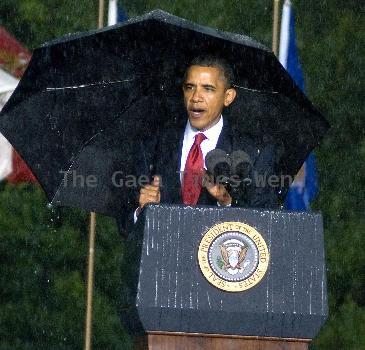US, European nations lead reproach of Iran over human rights record
By John Heilprin, APTuesday, June 15, 2010
Western nations slam Iran over human rights record
GENEVA — Western nations rebuked Iran for its human rights record Tuesday after overcoming an attempt by Iran and its Muslim allies to block the statement from being read aloud in the U.N. Human Rights Council.
The United States and Norway pressured Iran to make good on its pledge to improve human rights, crafting a statement that won the backing of all 27 European Union nations and more than two dozen other countries.
The statement, delivered by Norwegian Ambassador Bente Angell-Hansen, expressed concern over a “lack of progress in the protection of human rights in Iran,” especially since the widespread arrests and bloody crackdowns against dissidents that followed President Mahmoud Ahmadinejad’s re-election on June 12, 2009.
Iran’s shortcomings include “the violent suppression of dissent, detention and executions without due process of law, severe discrimination against women and minorities including people of Baha’i faith, and restrictions of expression and religion,” said the statement. It was agreed to by 56 nations, less than a third of all U.N. member nations.
“We cannot let this Human Rights Council session go by without marking the one-year anniversary of these events this month,” they said.
Iranian Ambassador Hamid Baeidi Nejad had interrupted Angell-Hansen and used a procedural maneuver to quash the statement during a morning session.
Also protesting on behalf of Iran was the Organization of the Islamic Conference. Pakistani Ambassador Zamir Akram, speaking for the 56-nation organization, said it was unfair to single out one country in a discussion that was supposed to be about a landmark human rights conference in Vienna in 1993.
Iran’s official news agency said Tuesday that Tehran objects strongly to a statement over the weekend by EU foreign policy chief Catherine Ashton about Iran’s human rights record and a “climate of fear” since the election.
Ashton said the EU believes Iran’s human rights situation “has gravely deteriorated,” with many Iranians suffering “violence, imprisonment and repression at the hands of the Iranian authorities over the last year.”
Iran’s foreign ministry told Spain, whose country holds the rotating EU presidency, that Ashton’s remarks were “politically motivated, biased, unreal and unconstructive,” according to the Islamic Republic News Agency.
Rights groups also have complained that Iran hasn’t allowed U.N. investigators to visit in recent years and isn’t fulfilling its obligations under international treaties.
Washington’s envoy to the Geneva-based rights council said the statement was initiated by her government and its backing by other nations was helped by its release after last week’s adoption of new U.N. Security Council sanctions over Iran’s nuclear program.
“In the end, the statement itself was a victory,” Ambassador Eileen Chamberlain Donahoe told reporters. “It was a little bit serendipitous, but it helped us, yes. It meant that countries here didn’t feel confused about how this would impact the conversation there,” she added.
It was little over a year ago that the United States won a seat on the 47-member body whose purpose is to assess the rights records of U.N. member nations. Nations that are not members can still speak and sign onto statements.
The Bush administration had chosen to stand apart from the council largely because of its members’ tendency to overlook their own shortcomings while harping on Israel’s treatment of the Palestinians under occupation.
But with the election of President Barack Obama, the new administration decided it could change the council best by working within it.
“What I hope you will take away from this moment, first and foremost, is that U.S. leadership at the Human Rights Council matters,” Donahoe told reporters, after Norway delivered the joint statement on Iran. “My second point is that this moment at the Human Rights Council is an important opportunity to honor the courage of the Iranian people.”
Iran had appeared before the council last week as part of a regular review of its rights record. The government has accepted 123 recent recommendations made by other countries while rejecting 45 and reserving judgment on 20.
The head of Iran’s delegation, Mohammad Javad Larijani, has rejected the U.S. criticism of his government’s human rights record, saying it was mostly “ill-founded and without any substance.”
Tags: Barack Obama, Europe, Geneva, Iran, Middle East, North America, Norway, Switzerland, United States, Western Europe





